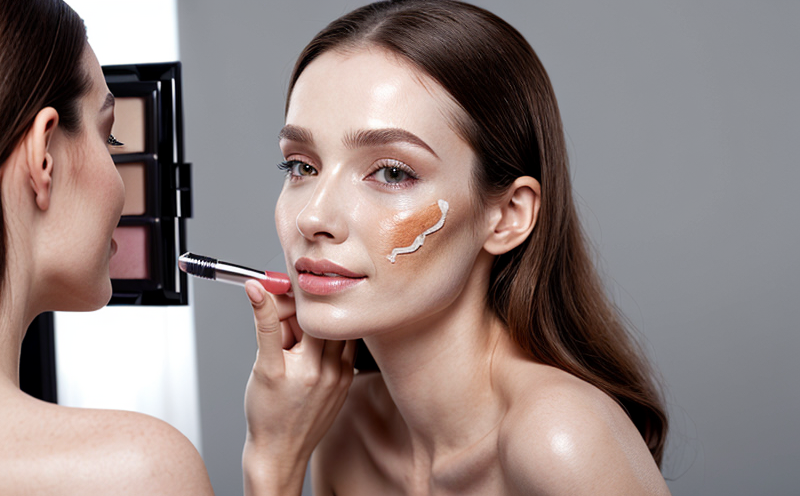Clinical Efficacy Testing of Anti-Aging Cosmetic Products
The clinical efficacy testing of anti-aging cosmetic products is a critical component in ensuring that these products deliver on their promises and meet the high standards expected by consumers. This process involves rigorous scientific methods to evaluate the effectiveness, safety, and overall performance of these products under controlled conditions.
Anti-aging cosmetics are designed to address signs of aging such as wrinkles, fine lines, and loss of elasticity. However, demonstrating that a product can deliver real benefits requires extensive research and testing. This service encompasses various stages including initial formulation evaluation, human subject studies, long-term monitoring, and comprehensive analysis.
During the clinical efficacy testing process, we employ advanced technologies to measure changes in skin parameters like wrinkle depth, elasticity, hydration levels, and pigmentation. We use standardized protocols based on international standards such as ISO 15194:2007 and ASTM E365-18 to ensure consistency and reliability of results.
The testing procedure typically begins with a detailed review of the product formulation to identify active ingredients that contribute to anti-aging effects. This is followed by recruitment of willing participants who undergo baseline assessments before applying the test product daily according to specified instructions.
Throughout the study period, which usually lasts several months, our team continuously monitors changes in skin characteristics through non-invasive techniques such as laser Doppler imaging and confocal microscopy. These technologies provide precise measurements that help assess improvements over time.
A key aspect of this testing is ensuring participant safety by closely observing any adverse reactions or side effects following application of the product. All data collected during these observations are meticulously recorded and analyzed to determine whether the observed improvements can be attributed to the use of the specific anti-aging cosmetic being evaluated.
After completion of the study, we compile all findings into detailed reports that summarize key outcomes including statistical significance levels associated with measured parameters. These reports serve as valuable resources not only for regulatory submissions but also for marketing purposes where they support claims made about a product’s efficacy.
In conclusion, clinical efficacy testing plays an indispensable role in validating the claims of anti-aging cosmetic products while providing assurance to consumers that what they are purchasing works as advertised.
Customer Impact and Satisfaction
The successful completion of clinical efficacy tests significantly enhances customer satisfaction by delivering tangible results. Consumers today expect more than just appealing packaging; they want products backed by science that can genuinely make a difference in their daily lives.
- Better Product Confidence: When customers see proof through scientific testing, it boosts trust and confidence in the brand.
- Informed Decision-Making: Providing clear evidence helps consumers choose products that best suit their needs based on proven benefits rather than marketing hype.
- Enhanced Brand Reputation: Positive outcomes from reputable labs improve overall brand reputation, fostering loyalty among existing customers and attracting new ones.
- Increased Sales: Satisfied customers are more likely to recommend products positively, leading to increased sales through word-of-mouth promotion.
A satisfied customer base translates directly into higher customer retention rates and repeat purchases. By investing in thorough clinical efficacy testing, brands not only meet but exceed consumer expectations, thereby building lasting relationships with their audience.
International Acceptance and Recognition
For businesses operating globally or targeting international markets, obtaining recognized standards is crucial. Our laboratory adheres to strict guidelines set by organizations such as the International Organization for Standardization (ISO) and ASTM International.
In particular, ISO 15194:2007 provides a framework for conducting clinical studies on skincare products, ensuring that all procedures are conducted ethically and with high standards of integrity. By meeting these criteria, our clients ensure their products receive international acceptance without unnecessary delays or rejections during regulatory approvals.
ASTM E365-18 further reinforces the credibility of our testing services by offering detailed guidance on specific aspects related to cosmetic product evaluation. Compliance with such internationally recognized standards not only enhances the reputation of our clients but also facilitates smoother entry into diverse markets worldwide.
Use Cases and Application Examples
| Use Case | Description |
|---|---|
| Evaluation of Retinol-Based Products: | This involves assessing the impact of retinol on reducing fine lines and improving skin texture. Participants use the product daily over a period of several weeks. |
| Hydroxyacids Content Analysis: | A study examining how different concentrations of hydroxyacids affect skin hydration and barrier function. |
| Photoprotection Assessment: | Evaluating the effectiveness of sunscreen formulations in protecting against UV radiation damage through various metrics including SPF rating. |
| Pigment Reduction Studies: | Determining whether certain ingredients can help reduce hyperpigmentation by comparing skin tone before and after treatment with the product. |
- Facial Wrinkle Reduction: Measuring changes in wrinkle depth using advanced imaging techniques like laser Doppler to evaluate the effectiveness of anti-wrinkle creams.
- Elasticity Improvement: Assessing improvements in skin elasticity by monitoring stretch and recovery properties post-treatment.
- Hydration Levels: Determining increases or decreases in water content within the epidermis after prolonged usage of hydrating serums.
- Promotion of Collagen Production: Investigating the ability of specific actives to stimulate collagen synthesis which is crucial for firmer, younger-looking skin.





